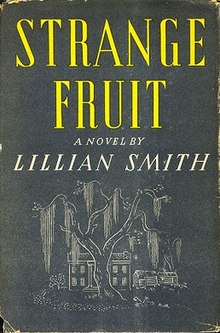Strange Fruit (novel)

First edition
|
|
| Author | Lillian Smith |
|---|---|
| Original title | Jordan is so Chilly |
| Country | United States |
| Language | English |
| Publisher | Reynal and Hitchcock |
|
Publication date
|
January 1944 |
| Media type | |
| ISBN | |
Strange Fruit is a 1944 bestselling novel debut by American author Lillian Smith that dealt with the then-forbidden and controversial theme of interracial romance. The title was originally Jordan is so Chilly, with Smith later changing the title to Strange Fruit. In her autobiography, singer Billie Holiday wrote that Smith chose to name the book after her song "Strange Fruit", which was about the lynching and racism against African-Americans, although Smith maintained that the book's title referred to the "damaged, twisted people (both black and white) who are the products or results of our racist culture."
After the book's release, the book was banned in Boston and Detroit for "lewdness" and crude language.Strange Fruit was also banned from being mailed through the U.S. Postal Service, with the ban against the book being lifted by President Roosevelt after his wife Eleanor Roosevelt requested it of him.
Strange Fruit takes place in a Georgia town in the 1920s and focuses on the relationship between Tracy Deen, son of some prominent white townspeople, and Nonnie, a beautiful and intelligent young black woman whom he once rescued from being attacked by a group of white boys. The two had been holding a secret affair, with Nonnie becoming pregnant with Tracy's child, only for Tracy to at one point plan for her to marry 'Big Henry', a man she despises. Tracy himself had originally planned to marry another white townsperson, but changed his mind after a conversation with one of the local preachers and intends on making his relationship with Nonnie public. He instead goes to Nonnie's house and tells her of his original intent to have her wed to Big Henry, having paid him money to do so. Despite this change of heart, Nonnie's brother overhears Big Henry telling of Tracy's payment and Big Henry's impending wedding to Nonnie and why. This prompts Nonnie's brother to go after Tracy and when Tracy's body is discovered later by Big Henry, Big Henry is accused of murdering a white man and is lynched.
Strange Fruit was banned in Boston and Detroit for charges of lewdness and language on March 20, 1944, only weeks after its release, making the book the first "#1 Bestseller" to be banned in Boston. Cambridge Police Chief Timothy J. O'Leary and the Boston Bookseller's Association both endorsed the book's banning, also asking for Smith to censor her work, removing "three lines of 'sexual phraseology.'" A letter in the Harvard Crimson criticized the banning of the book in Boston and the allegations of obscenity, saying that the usage of "an objectionable word" in Strange Fruit occurred during a scene when Nonnie is overcome by the "cruelty of her situation" and the memories of the "brutalities she has ever known", causing the book to be "the reverse of obscene".
...
Wikipedia
